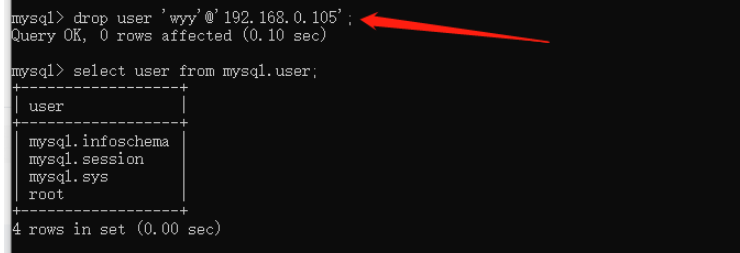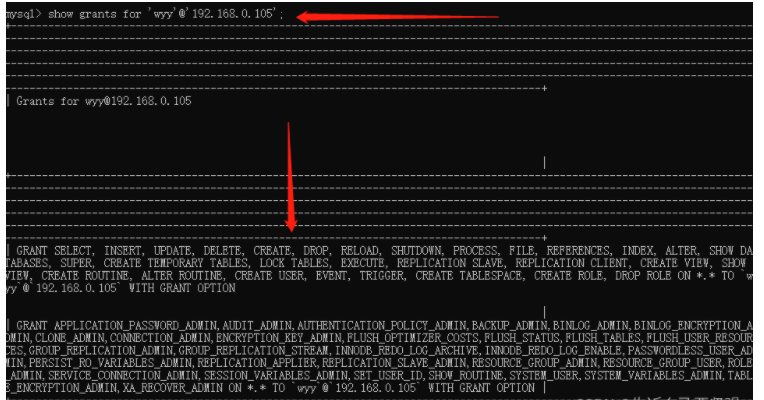 Database
Database
 Mysql Tutorial
Mysql Tutorial
 Mysql8 creates, deletes users and authorizes and cancels rights operations.
Mysql8 creates, deletes users and authorizes and cancels rights operations.
Mysql8 creates, deletes users and authorizes and cancels rights operations.
1. Log in to mysql
mysql -uroot -p
2. First check which users there are
select host,user from mysql.user;

Do not operate the yellow arrow, it is the MySQL system Comes with it; and the red arrow indicates the main administrator. The blue arrow is a sub-user. This is what I matched before. Now delete it and let’s start again.
3. Delete user:
drop user '用户名'@'主机名'; drop user 'wyy'@'192.168.0.105';

4. Create user
create user '用户名'@'允许那个主机链接' identified by '密码'; create user 'wyy'@'192.168.0.105' identified by 'wyy18222'; 只允许192.168.0.105的主机链接

Remarks:
Mysql8.0 uses caching-sha2-password encryption by default. Old clients may not support it and can be changed to mysql_native_password;
create user 'test'@'%' identified with mysql_native_password BY '密码';
Percent sign %; means that any IP address can be used Link
create user ‘wyy’@‘192.168.0.105’ identified by ‘wyy18222’;This is a link that can only be 192.168.0.105.
5. Change password
Alter user '用户名'@'主机名' identified by '新密码'; alter user 'wyy'@'192.168.0.105' identified by '123';
6. Authorization
Authorize all permissions to the user
grant all privileges on *.* to '用户名'@'主机名' with grant option; grant all privileges on *.* to 'wyy'@'192.168.0.105' with grant option;
grant: Authorize, grant
privileges :Permissions, privileges
The first asterisk: indicates all databases
The second asterisk: indicates all tables
The "with grant option" indicates that the user can grant permissions to other users, but not beyond the permissions granted to themselves.. It’s okay not to add this.
For example: If wyy only has select and update permissions, but no insert and delete permissions, when authorizing another user, it can only grant it select and update permissions, but not insert and delete permissions.
Authorize individual permissions to users
all privileges can be replaced by select, update, insert, delete, drop, create and other operations
grant select,insert,update,delete on *.* to '用户名'@'主机名';
Authorize specified permissions to users
Grant the specified database permissions to the user
grant all privileges on 数据库 . * to 'wyy'@'192.168.0.105'; grant all privileges on xrs . * to 'wyy'@'192.168.0.105'; 将数据库名为xrs的所有权限赋予wyy
Grant the specified table permissions to the user
grant all privileges on 数据库 . 指定表名 to 'wyy'@'192.168.0.105'; 将某个数据库下的某个表的权限赋予wyy
Note:
Some people on the Internet can create and empower directly:
grant all privileges * . * to ‘User to be created’@‘localhost’ identified by ‘custom password’;
I tried it in mysql8 but it didn’t work (below version 8 Haven’t tried it yet), you need to create a user first and then grant it, not at the same time
7. Flush privileges
flush privileges;
After setting up a new user or changing the password You need to use flush privileges to refresh MySQL's system permissions related tables,
Otherwise, access denied will appear
Another method is to restart the mysql server to make the new settings take effect.
8. Check user authorization
show grants for 'wyy'@'192.168.0.105';

9. Revoke user authorization (cancel authority)
revoke all privileges on *.* from 'wyy'@'192.168.0.105';
Whatever permissions the user has What permissions should be revoked?
Supplement: Pitfalls encountered by creating users and authorized users in mysql8.0
Creating users:
create user userName@localhost identified with mysql_native_password by 'password' ;(with mysql_native_password Without this, Navicat will not be able to log in prompt: 2059 - authentication plugin... error, because Navicat does not support the default encryption method of the latest database);
Authorized user:
GRANT ALL PRIVILEGES ON databaseName.* TO userName@'ip';(注意这点跟以往数据库都不一样,无需后面跟着IDENTIFIED BY 'password';否则将提示ERROR 1064 (42000): You have an error in your SQL syntax; check the manual that corresponds to your MySQL server version for the right syntax to use near 'IDENTIFIED BY 'password'' at line 5)
The above is the detailed content of Mysql8 creates, deletes users and authorizes and cancels rights operations.. For more information, please follow other related articles on the PHP Chinese website!

Hot AI Tools

Undresser.AI Undress
AI-powered app for creating realistic nude photos

AI Clothes Remover
Online AI tool for removing clothes from photos.

Undress AI Tool
Undress images for free

Clothoff.io
AI clothes remover

Video Face Swap
Swap faces in any video effortlessly with our completely free AI face swap tool!

Hot Article

Hot Tools

Notepad++7.3.1
Easy-to-use and free code editor

SublimeText3 Chinese version
Chinese version, very easy to use

Zend Studio 13.0.1
Powerful PHP integrated development environment

Dreamweaver CS6
Visual web development tools

SublimeText3 Mac version
God-level code editing software (SublimeText3)

Hot Topics
 1664
1664
 14
14
 1423
1423
 52
52
 1317
1317
 25
25
 1268
1268
 29
29
 1246
1246
 24
24
 MySQL's Role: Databases in Web Applications
Apr 17, 2025 am 12:23 AM
MySQL's Role: Databases in Web Applications
Apr 17, 2025 am 12:23 AM
The main role of MySQL in web applications is to store and manage data. 1.MySQL efficiently processes user information, product catalogs, transaction records and other data. 2. Through SQL query, developers can extract information from the database to generate dynamic content. 3.MySQL works based on the client-server model to ensure acceptable query speed.
 Laravel Introduction Example
Apr 18, 2025 pm 12:45 PM
Laravel Introduction Example
Apr 18, 2025 pm 12:45 PM
Laravel is a PHP framework for easy building of web applications. It provides a range of powerful features including: Installation: Install the Laravel CLI globally with Composer and create applications in the project directory. Routing: Define the relationship between the URL and the handler in routes/web.php. View: Create a view in resources/views to render the application's interface. Database Integration: Provides out-of-the-box integration with databases such as MySQL and uses migration to create and modify tables. Model and Controller: The model represents the database entity and the controller processes HTTP requests.
 MySQL and phpMyAdmin: Core Features and Functions
Apr 22, 2025 am 12:12 AM
MySQL and phpMyAdmin: Core Features and Functions
Apr 22, 2025 am 12:12 AM
MySQL and phpMyAdmin are powerful database management tools. 1) MySQL is used to create databases and tables, and to execute DML and SQL queries. 2) phpMyAdmin provides an intuitive interface for database management, table structure management, data operations and user permission management.
 MySQL vs. Other Programming Languages: A Comparison
Apr 19, 2025 am 12:22 AM
MySQL vs. Other Programming Languages: A Comparison
Apr 19, 2025 am 12:22 AM
Compared with other programming languages, MySQL is mainly used to store and manage data, while other languages such as Python, Java, and C are used for logical processing and application development. MySQL is known for its high performance, scalability and cross-platform support, suitable for data management needs, while other languages have advantages in their respective fields such as data analytics, enterprise applications, and system programming.
 Solve database connection problem: a practical case of using minii/db library
Apr 18, 2025 am 07:09 AM
Solve database connection problem: a practical case of using minii/db library
Apr 18, 2025 am 07:09 AM
I encountered a tricky problem when developing a small application: the need to quickly integrate a lightweight database operation library. After trying multiple libraries, I found that they either have too much functionality or are not very compatible. Eventually, I found minii/db, a simplified version based on Yii2 that solved my problem perfectly.
 Laravel framework installation method
Apr 18, 2025 pm 12:54 PM
Laravel framework installation method
Apr 18, 2025 pm 12:54 PM
Article summary: This article provides detailed step-by-step instructions to guide readers on how to easily install the Laravel framework. Laravel is a powerful PHP framework that speeds up the development process of web applications. This tutorial covers the installation process from system requirements to configuring databases and setting up routing. By following these steps, readers can quickly and efficiently lay a solid foundation for their Laravel project.
 MySQL for Beginners: Getting Started with Database Management
Apr 18, 2025 am 12:10 AM
MySQL for Beginners: Getting Started with Database Management
Apr 18, 2025 am 12:10 AM
The basic operations of MySQL include creating databases, tables, and using SQL to perform CRUD operations on data. 1. Create a database: CREATEDATABASEmy_first_db; 2. Create a table: CREATETABLEbooks(idINTAUTO_INCREMENTPRIMARYKEY, titleVARCHAR(100)NOTNULL, authorVARCHAR(100)NOTNULL, published_yearINT); 3. Insert data: INSERTINTObooks(title, author, published_year)VA
 Solve MySQL mode problem: The experience of using the TheliaMySQLModesChecker module
Apr 18, 2025 am 08:42 AM
Solve MySQL mode problem: The experience of using the TheliaMySQLModesChecker module
Apr 18, 2025 am 08:42 AM
When developing an e-commerce website using Thelia, I encountered a tricky problem: MySQL mode is not set properly, causing some features to not function properly. After some exploration, I found a module called TheliaMySQLModesChecker, which is able to automatically fix the MySQL pattern required by Thelia, completely solving my troubles.



